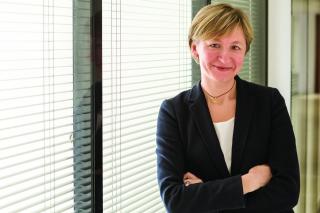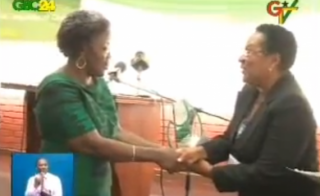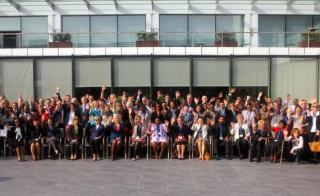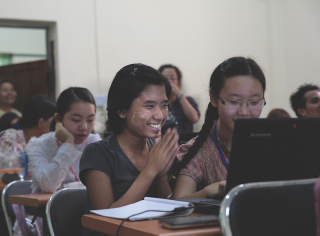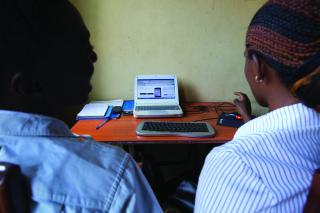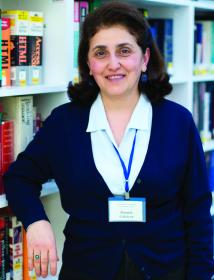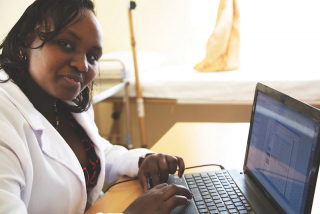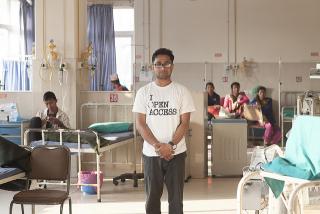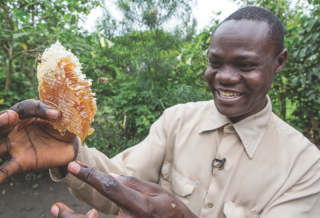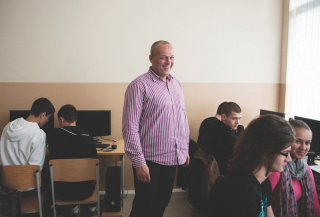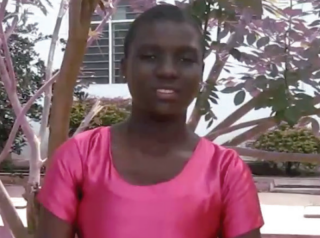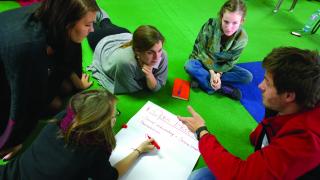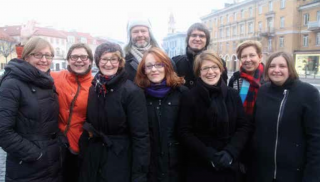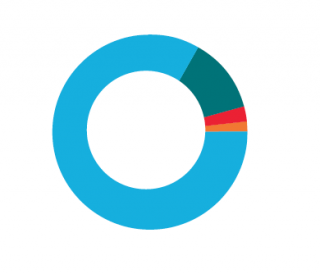Warning message
The Start date field mapping must be configured in the TimelineJS format settings before any slides or eras can be rendered.This annual report celebrates our 15th anniversary by sharing with you stories from some of the people whose lives have changed as a result of our work.
Knowledge is invaluable — to both people and the development of society. EIFL works with libraries to enable access to knowledge for education, learning, research and sustainable community development.
When EIFL was founded 15 years ago, in
1999 as a project of the Open Society Institute (now the Open Society Foundations), the world was undergoing tremendous change.
As post-Soviet bloc countries began to open up, researchers and the academic community were hungry for up-to-date information.
At the same time the internet was gaining momentum, presenting an incredible opportunity to bridge the information gap.
It was in this environment that EIFL began to negotiate with publishers for affordable access to online journals for academic and research libraries in Central and Eastern Europe.
However, many publishers continued to charge high subscription fees for important journals, and knowledge remained unaffordable and unattainable for scholars in developing and transition economy countries.We realized that we needed to do more to address the issue of affordability.
In 2002, EIFL joined an international meeting of eminent scientists and academics in Budapest. This meeting resulted in a worldwide campaign for open access to all new peer-reviewed research.
EIFL’s contribution to furthering the open access movement through advocacy and mobilization of the EIFL network fills me with considerable pride.Today, as a result of EIFL’s work, there are over 4,000 open access journals and over 700 open access repositories in our partner countries.
Researchers and scholars everywhere — in both developing and developed countries — are benefiting from open access content, and the idea of open access has gained acceptance all over the world.
I am also particularly proud of our persistence in tackling legal barriers to access and use of digital content by advocating for fair national copyright laws. We have made considerable gains in nine EIFL partner countries.
In 2013, we welcomed the adoption of a new international treaty, the Marrakesh Treaty, which facilitates access to published works by blind, visually impaired and otherwise print-disabled people.EIFL is now supporting ratification of the Marrakesh Treaty in our partner countries and its implementation into national copyright law. We continue to press the World Intellectual Property Organization (WIPO) for an international copyright treaty for the benefit of libraries and all the people who use them.
As the internet expanded to reach more places, we started working with public and community libraries, encouraging them to introduce technology into their services.
With our support, over 300 public libraries in 27 countries are offering services that are helping improve the lives and livelihoods
of farmers, jobseekers, vulnerable children and youth, women, health workers and their patients, disabled and socially excluded people.
Our work now reaches over 60 countries in Africa, Asia, Europe and Latin America. Last year, we were pleased to welcome Myanmar to the EIFL network.
For the first time, five major universities in Myanmar now have online access to international journals, databases, and e-books through the EIFL elibrary Myanmar project.
None of this would have been possible without the support of our board members; the hard work of our committed and enthusiastic staff team, and the many dedicated librarians who take forward the work of our programmes in our partner countries.
Thank you.
Rima Kuprytė, Director of EIFL
Knowledge is invaluable – to both people and the development of society. When EIFL was founded 15 years ago, the internet was gaining momentum, presenting an incredible opportunity to bridge the information gap.
EIFL-partner library consortia in three countries – Ghana, Kenya, Zambia commemorated their 10th anniversary in 2014.
“For me KLISC (the Kenyan Library and Information Consortium) is a dream come true,” remembers Jacinta Were, the former EIFL Country Coordinator for Kenya. “It was a difficult time with dramatic financial cuts to libraries and zero level budgets for journals. And then we collectively subscribed to information resources, and it worked!”
The startup was thorny, and there were many common challenges to building effective consortia all these years ago. Some of the issues back then included recruitment and retention of active members, establishing good governance, developing the ICT competencies of librarians and ensuring the continued availability of e-resources and good connectivity.
Dr. Joel Sam, EIFL Country Coordinator for Ghana, says that one of CARLIGH’s major achievements includes the acquisition of land in Ghana to build consortium offices, conference facilities and a hostel to continue their work.
Equally important was developing fruitful relationships with stakeholders: advocating for adequate library budgets, building the digital skills of users, raising awareness of the importance of open access and copyright amongst decision makers and academia.
Over the past ten years there have also been many major accomplishments.
“Our major accomplishment in ten years was the acquisition of land to build consortium offices, conference facilities and a hostel,” explains Dr. Joel Sam, EIFL Country Coordinator for Ghana, at the First International Conference to celebrate the 10th anniversary of CARLIGH, the Consortium of Academic and Research Libraries in Ghana.
According to Sam, creating this base for financial sustainability was made possible by the wise investment of internally generated funds over the years.
Eness Chitumbo, the Zambia Country Coordinator, focuses on another, equally important area for the sustainability of ZALICO, the Zambian Library and Information Consortium:
“The consortium has formulated a two-year strategic plan to run from 2012-2014. Its vision is to provide a leading platform for information sharing in Zambia and world over,” says Chitumbo.
Eness Chitumbo, the Zambia Country Coordinator, says that her library consortium has created a strategic plan that is moving forward on issues of consortium expansion and the promotion of the use of free and open source software, e-resources and open access.
“Strategic areas include consortium expansion, promotion of the use of free and open source software, e-resources and open access. This means that the work of the consortium is planned way in advance, and people work towards achieving set goals and objectives.”
Through effective advocacy and promotion, all three consortia have experienced substantial growth in the number of active member libraries and e-resource’ subscriptions.
These last ten years have also seen the creation of an impressive range of open access repositories, making indigenous research output visible to the world. The consortia have enhanced the visibility of libraries through joint advocacy activities, and support professional advancement by providing a framework for knowledge sharing and capacity building.
There is no shortage of lessons’ learnt - important knowledge that the consortium coordinators shared willingly at the 2014 General Assembly in Istanbul: ‘Involve the stakeholders, find your champions, repackage and share information’ is recommended by KLISC; ‘target government officials and new higher learning institutions’ suggests ZALICO; ‘adopt openness and equality as principles for consortium governance’ is the advice of CARLIGH.
Dr. Helena Assamoah-Hassan, chairperson of AfLIA, the African Library and Information Association, former Ghana EIFL Country Coordinator and past member of the EIFL Advisory Board, sums it all up nicely looking back to the beginnings in 2004:
“From a humble beginning of six members in 2004 to a membership of over 30 now has been a lot of hard work,” she says.
Growing from a humble beginning of six members in 2004 to a membership of over 30 now has been a lot of hard work says Dr. Helena Assamoah-Hassan, chairperson of AfLIA, the African Library and Information Association and former Ghana EIFL Country Coordinator.
“Some of us had to use our personal financial resources for initial services and a lot of our energies and time to see it grow healthily,” she continued.
“I remember when I combined the roles of Chairperson and Treasurer to have a firm grip on the financial strings. It has yielded fruit and now we have investments and at least one year reserve of funds for e-resources subscription,” she says.
“My greatest joy was when I handed over the consortium in March 2014 to the next chairperson and moved on to retirement. CARLIGH is a success story, and I am happy to have been very much involved on its road to success.”
It was a long journey to get to this point. There were challenges and successes, cross-cultural learning, new friendships and incredible growth.
These were just some of the sentiments shared at the 2014 General Assembly (GA), as librarians, publishers, staff and invited speakers came together to mark EIFL’s 15th anniversary in Istanbul, Turkey.
The group of participants this year was truly international, as 98 participants from 51 countries were on hand to celebrate with EIFL during our annual knowledge-sharing and networking event, which was held from 10th to 12th of November.
EIFL's Director, Rima Kupryte, opened the GA with a special presentation and - in the context of the anniversary - reflected on EIFL's major milestones over the last fifteen years.
“Thank you to everyone who helped bring EIFL to this point today,” she said. “EIFL has had so many major milestones and achievements over the years, and we couldn’t have done it without your support.”
Participants from China, Fiji and the Maldives listen closely during one of the EIFL GA Trends to Watch sessions.
Three key topics were introduced by expert guest speakers in interactive “Trends to Watch” sessions: ORCID: Connecting Research and Researchers, Moving Discovery and Management Systems to the Cloud and Linked Open Data: best practices for publishing, sharing, and interlinking structured data on the Web. These sessions sparked a great deal of interest and discussion.
There was also a number of dinners sponsored by EIFL’s publisher partners. During one of the event dinners, EBSCO, the gold sponsor of the GA and EIFL's first major publisher partner back in 1999, was thanked for their years of partnership and support in providing access to electronic resources in developing and transition countries.
“EBSCO is very proud of our involvement with EIFL both then and now,” says Paul Donovan, EBSCO's Senior Vice President of Sales for Europe and Latin America. Paul was the responsible person at EBSCO for EIFL involvement for a good portion of that time.
“At its inception EIFL looked to address the real discrepancy between what information was available to the research community in developed countries versus what information was available in developing countries,” he continued.
In recognition of the success of the Zambia Library Consortium (ZALICO), Eness Chitumbo, Country and Licensing Coordinator for Zambia (middle), was awarded a Kindle, which was kindly donated by Royal Society Publishing.
“The gap was significant and widening by the year. The EIFL project stepped in to help fill that gap and bridge the “digital divide”. EBSCO was happy and proud to play a role in that noble cause,” he says.
"Through the years the EIFL team has been tireless. It’s heartening to see those efforts continue to this day to help developing and transition countries meet the changing challenges they face."
At this year’s GA, we celebrated the impressive achievement of our partner consortium in Zambia, who made the biggest progress in both the use and take up of subscriptions to EIFL licensed resources.
An award of a Kindle went to Eness Chitumbo, Country and Licensing Coordinator for Zambia for those achievements and all of the GA participants were also treated to gifts of new EIFL t-shirts to mark the event.
THE EARLY DAYS
EIFL was founded in 1999 and first began as a project of the Open Society Institute (now the Open Society Foundations - OSF) in Budapest.
For Marika Meltsas, an EIFL Country Coordinator and Licensing Coordinator in Estonia, attending EIFL’s anniversary GA this year was a reminder of just how far the organisation has come.
Meltsas has been with EIFL since those early years, when she was a librarian from Tartu University in Estonia and was asked to attend the very first meetings. She recalls how different the information landscape for librarians and researchers was back then.
“Fifteen years ago, even internet connectivity was a big problem for some libraries. We had to make sure that the e-resources were not only available online but also on CD-ROMS for many countries,” she laughs.
Marika Meltsas, EIFL Country Coordinator and Licensing Coordinator in Estonia (right) celebrates EIFL’s 15th anniversary with Karmen Sotosek (left) EIFL Country Coordinator in Slovenia. Marika was involved in EIFL's first negotiations with publishers team.“At the time, countries like Estonia had almost no budget for libraries, and many other smaller countries had no purchasing power with publishers," she says. "So it was very important to have help from EIFL in building a library consortium who could negotiate for very low prices to help them start with even some resources,” she says.
When EIFL first began, the team was advocating for affordable access to commercial e-journals for academic and research libraries in Central and Eastern Europe, which Meltsas was involved in.
“I still remember the first meeting with publishers in Amsterdam. When we introduced what we wished to do with EIFL and what we needed from them,” she says.
“It was very exciting for me personally, because I had never attended this type of event. It was the beginning of EIFL's licensing activities. I was excited at what was the outcome of this work we were undertaking would be,” she says.
Flash forward to today. Meltsas says that while much has changed in Estonia since EIFL began, there is remains a great need for access to online resources.
“Estonia’s research intensity has improved year by year. Our researchers are very grateful for all these e-resources they now have access to. They make use of them,” she explains.
“At the same time, the standard of living and the GDP is still much lower than advanced countries. This is reflected in the budget for research. On the whole, we are still striving to become a knowledge-based society. So these e-resources are very important to us.”
Through the years the EIFL team has been tireless. It’s heartening to see those efforts continue to this day to help developing and transition countries meet the changing challenges they face.
Paul Donovan, EBSCO's Senior Vice President of Sales for Europe and Latin America.
GROWTH AND CHANGE OVER THE YEARS
Arnold Hirshon, EIFL's Management Board member and Associate Provost and University Librarian at Case Western Reserve University was also with EIFL 15 years ago and can look back fondly.
He was invited to the first meeting in Budapest in 2000 to talk about the state of library consortia in the world, what has happening, and what EIFL needed to do to get organized.
“At the time there was an explosion of electronic information,” he says, describing the environment fifteen years ago for librarians. “Libraries were wondering: What should they buy? How much would it cost? From whom should they buy it?”
Arnold Hirshon, EIFL's Management Board member, presents at the EIFL GA. For Hirshon, being able to both witness and be involved in EIFL’s growth over the past 15 years has been incredibly rewarding.In those early days, he worked with Monika Elbert, now EIFL’s Senior Policy Advisory, helping countries to build their library consortia.
For Hirshon, being able to both witness and be involved in EIFL’s growth over the past 15 years has been incredibly rewarding.
“What has been exciting has been seeing that EIFL has grown from one block of countries to being on three continents,” he says.
“And seeing our partner library consortia do things, rather than just talk about them. Seeing them get their consortium off the ground and getting people in the libraries involved and excited about what they can do,” he continues.
"I think the most rewarding thing has been watching how so much is being done by so many librarians with so few resources,” he concludes.
"And it doesn’t stop them. They just see it as a challenge. That is the way they always dealt with their lives, and they just find a creative way of doing something with very little.”
Enter the University of Mandalay Library on any given day and you will find Durga Daewi, a second-year Masters of Law student, in front of a computer busily preparing for her thesis.
For millions of university students around the world using the internet to study and having access to high quality e-journals and e-books are taken for granted.
But for Durga Daewi and thousands of other students in Myanmar, it has been a revelation.
“In the past, printed textbooks were difficult to find. And if you did manage to find one, it was very expensive,” Durga Daewi explains.
Thanks to a new e-library at the University of Mandalay, Durga Daewi can now access the texts she needs online.
The e-library, comprising more than 10,000 full-text scholarly journals and 130,000 full- text academic e-books, is a central component of the EIFL eLibrary Myanmar project.
This groundbreaking project, which supports educational change in Myanmar, is making
a fundamental difference to the lives of students, researchers and academics.
A COUNTRY IN TRANSITION
The launch of the EIFL eLibrary Myanmar project could not have been more timely.
When EIFL launched the 18-month project in December 2013, Myanmar was undergoing tremendous change. After decades of isolation, the country was opening up to
the outside world.
Following student protests, the government had suspended undergraduate studies in
1988 at the University of Mandalay and the University of Yangon. In December 2013, they were at last allowed to reopen their doors to undergraduate students.
The new students had high learning expectations that the universities were anxious to meet.
The university library collections were limited, out of date, and many books were falling apart. Students shared a handful of donated computers and struggled with slow internet.
Until the start of the project, no universities in Myanmar had access to online subscription resources.
Professors were hard pressed to catch up with developments in their fields and had to resort to contacting universities abroad to ask for journal articles to be sent via email.
INNOVATIVE NEW PROJECT
The EIFL eLibrary Myanmar project set out to overcome these challenges by providing instant online access to a world-class collection of specially selected international journals, databases and e-books, and training students and librarians how to use them.
The project began by working with the University of Mandalay and the University of Yangon in early 2014, aiming to provide effective support for teaching, research and
learning across all faculties — from the social sciences and humanities to the sciences.
The universities installed new fibre optic cables to increase internet bandwidth and purchased new computers.
Demand for access to the e-resources was immediate.
Impressed by the impact of the EIFL eLibrary Myanmar project at the University of Mandalay and the University of Yangon, three more universities invested in similar infrastructure and became partners in 2014: Dagon University, Yadanabon University and the Yangon University of Economics.
IMPROVING TEACHING AND LEARNING
Professors say the impact of the resources on teaching has been transformative.
Professor Mi Mi Gyi, Head of the International Relations and Politics Department at the University of Mandalay, says she has already seen a marked improvement in her students’ work as a result of the availability of e-resources.
“Now we are changing our education system from a teacher-centred approach to a student-centred approach. So, as teachers, we need to inspire the curiosity of our students,” she says.
“We ask them a lot of questions and they find out what they want to know from the online resources.”
SHAPING POLICY MAKING
Myanmar is currently revising its old laws, and introducing many new laws.
Dr Khin Mar Yee, Professor of Law at the University of Yangon, was invited by the Ministry of Science and Technology to help shape the country’s new draft laws on trademark, industrial design, patents and copyright.
“Myanmar’s current Copyright Act was enacted in 1914 during British colonial rule,” says Dr Khin Mar Yee. “So we need IP laws that are in line with our situation today.”
It is expected that the new draft copyright law will be sent to Parliament in 2015.
To do her current work, Dr Khin Mar Yee relies heavily on the new e-library at the University of Yangon to stay up to date.
“The law books we had were very difficult to buy and not sufficient for the many fields of law,” explains Dr Khin Mar Yee.
“The new e-resources are very beneficial for research and legal education. They make
it much easier for legal scholars to find out about relevant laws and legal precedents,” she continues. “They are essential for us.”
LOOKING TO THE FUTURE
For development to be sustainable in Myanmar, Dr Thaw Kaung, a former Chief Librarian at the University of Yangon, says universities will need to play a leading role.
“We need educated people to run the country,” said Dr Thaw Kaung in a 2014 interview with The Associated Press.
“We can’t just rely on foreign aid and experts. Without a university producing capable persons, it will be difficult to sustain development in the long run.”
EIFL will continue to work with all five universities, and key priorities will include improving the dissemination of their research results through open access, to maximize the visibility, usage and impact of their research publications.
EIFL will also provide assistance in the development of the new copyright law to better support university teaching and learning in the digital environment.
In addition, EIFL will support the creation of a national library consortium to incorporate many of the country’s universities.
By working together in a consortium, libraries can make more e-resources available to more people more cost effectively.
According to Dr Kyaw Naing, Pro-Rector of the University of Yangon, the impact of the eLibrary Myanmar project on his university will be far reaching.
“The establishment of the e-library at the University of Yangon is a significant development in our university’s history,” says Dr Kyaw Naing.
“This is a turning point. In the coming years, any major achievements from our university in teaching, learning and research will be related to the EIFL eLibrary Myanmar project.”
Dr Thida Win, Pro-Rector of the University of Mandalay, agrees.
“Having access to knowledge online has truly changed our university,” says Dr Thida Win.
“The up-to-date information and e-resources have helped us to equip our students, educators and teachers better.”
And for students such as Durga Daewi, on whom the direction of the country ultimately rests, the future looks hopeful.
The 22-year-old hopes to use her newfound knowledge of the law to empower others.
“My country is a developing country, so most of the citizens are uneducated,” she says.
“Many are afraid of the law. I want to share with them information about the Myanmar legal system. I want to educate them.”
The eLibrary Myanmar project is funded by the Open Society Foundations’ Higher Education Support Program (HESP).
This is a turning point. In the coming years, any major achievements from our university in teaching, learning and research will be related to the EIFL eLibrary Myanmar project.
Using knowledge to change their lives and the lives of others
This annual report celebrates our 15th anniversary by sharing with you stories from some of the people whose lives have changed as a result of our work.
LIBRARIAN, YEREVAN (ARMENIA)
Hasmik Galystan, head of Reference and Circulation Services at Papazian Library, American University of Armenia, has been a librarian for 30 years.
She has also served as the EIFL Copyright Coordinator for the Electronic Library Consortium of Armenia for the past nine years.
Hasmik regularly encounters copyright restrictions that are a barrier to learning. For example, a student recently needed two chapters of a book that was not available in Armenia. Hasmik requested the material through the interlibrary document supply service, but the request was denied because the two chapters exceeded 20% of the book.
With the support of the EIFL Copyright and Libraries Programme, Hasmik has become a passionate advocate for modern copyright laws that support libraries in serving the needs of their user communities. Through active engagement in the review process, she has made vital contributions to Armenia’s new draft copyright law.
In December 2014, Hasmik attended the 29th session of the World Intellectual Property Organization’s (WIPO) Standing Committee on Copyright and Related Rights - the main body that shapes international copyright laws — for the first time as part of the EIFL delegation. She returned home from Geneva with new energy.
Hasmik plans to continue her advocacy so that the new copyright law, when finally adopted by the National Assembly, does not deny students access to educational materials.
In 2014: 11,490 people trained in copyright related topics across the EIFL network.
I met many copyright experts in Geneva. I returned home with the knowledge that librarians can make a difference when copyright laws are being amended.
DOCTOR, EMBU (KENYA)
Bessie works as a general physician in Embu General Provincial Hospital in Kenya’s Eastern Province. The hospital serves a vast rural area that has only one doctor to every 10,000 people.
Bessie struggles to access information. Distance and pressure of work mean her colleagues are not available to meet and share information about diagnoses, illnesses and treatments.
Bessie became aware of open access — the immediate, online, free and unrestricted availability of peer-reviewed research literature — through a workshop supported by the EIFL Open Access Programme.
The workshop was part of an EIFL project that educated researchers, students and health workers about new ways of sharing scholarly information. The workshop also raised awareness about open access to the Kenyan medical research.
Bessie has now become a frequent user of open access literature to treat her patients.
In the future, Bessie hopes to return to university to specialize in epidemiology, the study of how often diseases occur in different groups of people and why. To study in this field she will need to access research in many scientific disciplines such as biology, statistics, social sciences and even engineering.
Bessie says she will continue her professional career in the Kenyan public healthcare sector, giving back to her community and the people of Embu.
IN 2014: 67 more open access journals and 52 more open access repositories were launched in the EIFL network.
UNIVERSITY STUDENT, KATHMANDU (NEPAL)
Roshan Kumar Karn is a medical student in his final year of study at Tribhuwan University in Kathmandu, Nepal. He wants to help people who are suffering from heart disease, and plans to specialize in interventional cardiology.
But as he progressed in his studies, Roshan realized that the information he needed was not available in his textbooks. He began researching the internet for medical texts.
He recalls the joy he felt when he found relevant abstracts, only to be disappointed when he was locked out by publisher paywalls.
After learning about open access at an international conference, he launched Open Access Nepal, an organization that promotes free and unrestricted online access to research in his country.
With support from the EIFL Open Access Programme, the new organization hosted its first conference during Open Access Week 2014.
Roshan’s future plans include spreading awareness of open access at five major universities, building an institutional repository at Tribhuwan University to house its research online, and working with the Government of Nepal to digitize textbooks and turn them into open educational resources.
IN 2014: 41,629 people trained in open access topics across the EIFL network.
UNIVERSITY ADMINISTRATOR, NAIROBI (KENYA)
Professor Lucy W. Irungu is the Deputy Vice-Chancellor, Research, Production and Extension at the University of Nairobi, the largest university in Kenya.
The university conducts important research in a variety of fields. However, much of this research was inaccessible to most Kenyans and the international community, because it was still being printed and placed on shelves.
The EIFL Open Access Programme supported Professor Irungu and the university to develop an open access policy to ensure that research results are made freely available to all.
To put the policy into practice, Professor Irungu worked closely with Rosemary Otando, a librarian at the University of Nairobi, and her team to launch an open access repository (an online database that houses all the research).
The policy has been instrumental in helping the university to open up a wealth of knowledge from Kenyan researchers to the world.
By the end of 2014 the digital repository contained over 70,000 documents.
IN 2014: 22 more institutions adopted open access policies across the EIFL network.
FARMER, KASESE DISTRICT (UGANDA)
Alex Thabulenga is a beekeeper from Kasese District in western Uganda who manages 59 colonies of bees.
He first used the internet at his local library, Bwera Information Centre.
The library is one of five connected to the internet through an agricultural information and digital technology training programme for farmers supported by the EIFL Public Library Innovation Programme.
Using information obtained online, Alex formed a collective with other beekeepers.
They pooled their resources to buy a refractometer, and for the first time were able to accurately measure the moisture content in their honey.
In just six months, the new beekeepers’ collective doubled their production of pure honey from one to two tons.
Alex and other farmers are now committed to contributing to the cost of the library’s internet connection.
IN 2014: 80 public libraries in Ghana, Kenya and Uganda attended EIFL training on developing new services that meet
TEACHER, JAGODINA (SERBIA)
Zoran Miljkovic became a computer programming teacher because he wanted future generations to share his passion for digital technology.
He has taught at a high school in Jagodina for over 14 years.
But teaching was frustrating: firstly, the tight school schedule meant there was limited time in class for practical sessions, and secondly, the school did not have sufficient equipment to allow students to try out their computer programming theory in practical applications.
To Zoran’s surprise, a nearby library helped him overcome both these challenges.
With support from the EIFL Public Library Innovation Programme, Public Library ‘Dušan Matic’ in Cuprija introduced an extramural activity for practical computer coding skills and robotics workshops in the library and at nearby schools.
Using robotics kits, children and youth are now building robots, and writing computer programmes to bring them to life.
Zoran says that now his students can immediately see how their coding works, and this motivates them to learn more.
In future, Zoran plans to liven up exams by testing his students’ practical skills.
IN 2014: 28 more public and community libraries benefited from funding awarded by EIFL for new services that
STUDENT, VOLTA REGION (GHANA)
Maude Gati is a 15-year-old student living in the Volta Region of eastern Ghana who dreams of becoming an engineer.
To realize her dream she needed to pass the Basic Education Certificate Examination, which determines access to secondary school.
Maude feared she would fail because she was getting poor grades in an important subject: information and communication technology (ICT).
Like many children in Ghana, Maude attends a school that does not have computers or an internet connection. Without practical experience, she struggled to understand ICT.
Her local library offered a solution.
With support from the EIFL Public Library Innovation Programme, Volta Regional Library travels to rural schools bringing solar powered laptops and wi-fi internet. Working with teachers, librarians teach the children basic computer and internet search skills.
Every week, the library visits six schools, reaching over 600 children.
As a result of these classes, Maude passed her exams and is now a student at Mawuko Girls Senior High School.
IN 2014: 50% of all public libraries in Ghana, Kenya and Uganda upgraded their staff computer literacy skills through training by EIFL.
We would also like to thank our talented team of staff, advisory and management board members for their enthusiasm and commitment.
(photo from left - Rima Kuprytė, Ramunė Petuchovaitė, Teresa Hackett, Andrius Kriščiūnas, Carla MacCallum Grazioli, Edvaldas Baltrūnas, Romy Beard, Jean Fairbairn and Iryna Kuchma.

